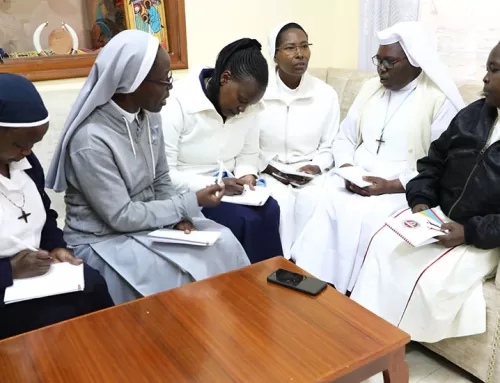Religious life remains a vital path for many young Africans seeking to serve God and their communities. A recent study, commissioned by the Conrad N. Hilton Foundation and conducted by CERRA-Africa in collaboration with CARA USA, sheds light on the experiences of those who formally entered religious congregations between 2021 and 2023. The study spanned five African countries Kenya, Ghana, Malawi, Uganda, and Zambia and focused on the characteristics of new entrants, how they discerned their vocations, and the joys and challenges they experience in religious life.
With over 800 responses collected, this research provides valuable insights into the spiritual and personal journeys of men and women called to serve. Here’s what the findings revealed:
 The study in Kenya gathered 218 responses from individuals who entered religious life in 2022. Conducted between November 2022 and January 2023, the research revealed that many entrants were young adults from rural areas. Key influences included supportive families, parish involvement, and exposure to vocation programs in schools and youth ministries. Respondents shared that spiritual mentorship and a deep prayer life played a crucial role in their discernment. Kenya remains a leader in nurturing religious vocations through strong community and Church support.
The study in Kenya gathered 218 responses from individuals who entered religious life in 2022. Conducted between November 2022 and January 2023, the research revealed that many entrants were young adults from rural areas. Key influences included supportive families, parish involvement, and exposure to vocation programs in schools and youth ministries. Respondents shared that spiritual mentorship and a deep prayer life played a crucial role in their discernment. Kenya remains a leader in nurturing religious vocations through strong community and Church support.
 In Ghana, 92 individuals who joined religious congregations in 2021 and 2022 participated in the study. The data, collected between August 2021 and May 2022, highlighted the importance of retreats, school chaplaincy programs, and active youth groups. Many respondents credited religious sisters and priests for guiding them toward religious life. The study showed that while challenges exist, such as financial barriers and adapting to communal life, the desire to serve remains strong among Ghanaian youth.
In Ghana, 92 individuals who joined religious congregations in 2021 and 2022 participated in the study. The data, collected between August 2021 and May 2022, highlighted the importance of retreats, school chaplaincy programs, and active youth groups. Many respondents credited religious sisters and priests for guiding them toward religious life. The study showed that while challenges exist, such as financial barriers and adapting to communal life, the desire to serve remains strong among Ghanaian youth.

Malawi’s study, conducted in 2023, included 43 individuals who entered religious life in 2022 and 2023. Most came from rural backgrounds and emphasized the role of family, local parishes, and Church traditions in shaping their call. Prayer and reflection were central to their discernment process. While resources were limited, especially in formation houses, the respondents showed a strong commitment to religious life and expressed hope in overcoming these obstacles through faith and perseverance.
 Uganda had the highest participation, with 420 responses from individuals who entered religious life in 2021. The study, carried out between August 2021 and May 2022, showed a rich culture of faith rooted in community. Youth ministries, choirs, and parish activities played a major role in inspiring vocations. Many respondents were influenced by religious role models and expressed joy in living out their faith through service. Structured discernment and formation programs were seen as essential for long-term success in religious life.
Uganda had the highest participation, with 420 responses from individuals who entered religious life in 2021. The study, carried out between August 2021 and May 2022, showed a rich culture of faith rooted in community. Youth ministries, choirs, and parish activities played a major role in inspiring vocations. Many respondents were influenced by religious role models and expressed joy in living out their faith through service. Structured discernment and formation programs were seen as essential for long-term success in religious life.
 In Zambia, 67 individuals who entered religious congregations in 2021 took part in the study. The survey was conducted between August 2021 and May 2022. Respondents came from both urban and rural areas and were inspired by parish activities, school-based religious programs, and the witness of clergy. Though some faced challenges such as limited resources and adjusting to community living, most described their experiences as spiritually enriching and fulfilling.
In Zambia, 67 individuals who entered religious congregations in 2021 took part in the study. The survey was conducted between August 2021 and May 2022. Respondents came from both urban and rural areas and were inspired by parish activities, school-based religious programs, and the witness of clergy. Though some faced challenges such as limited resources and adjusting to community living, most described their experiences as spiritually enriching and fulfilling.
The study reveals that young people across Africa continue to respond generously to the call to religious life. Through strong community support, personal faith, and formal formation programs, they are shaping the future of the Church. CERRA-Africa remains dedicated to supporting and empowering new vocations across the continent through ongoing research and collaboration.






